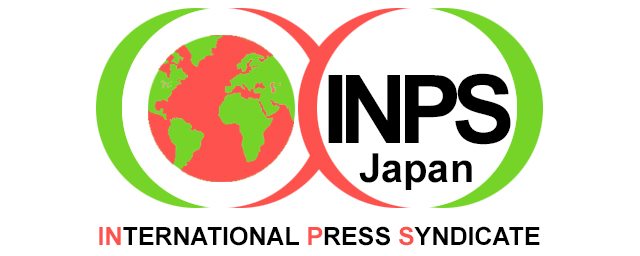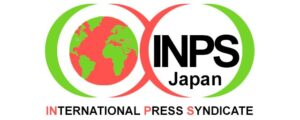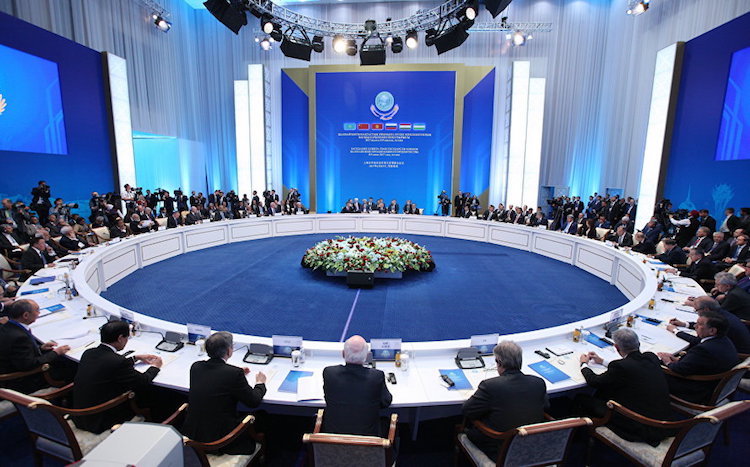By Ramesh Jaura
This is the third in a series of articles from Kazakhstan which being geographically located both in Asia and Europe, considers itself a Eurasian country. The articles are based on information gathered during a visit from June 7 to June 15 on the occasion of the opening of EXPO 2017 in Astana. Video clips accompany the articles in this series. – The Editor
ASTANA (IDN) – Kazakhstan, which is a non-permanent member of the UN Security Council for 2017-2018, played a crucial role in the summit meeting of the Shanghai Cooperation Organisation (SCO), chaired by President Nursultan Nazarbayev, on June 8-9 in Astana.
The United Nations drew much of the focus of the SCO heads of state gathered in the Kazakh capital city. But they also underlined the importance of the Organisation’s further consolidation as an effective full-fledged regional platform aimed at active participation in building a more equitable, polycentric model of the world order.
Such a world order in their view would meet the interests of each and every state, promoting the process of democratisation of international relations, creating an effective global and regional architecture of security and cooperation, and forming a human community linked by a common destiny.
According to a press release, they reaffirmed their commitment to the view that there is no alternative to the political and diplomatic settlement of conflicts in various regions of the world on the basis of strict adherence to universally recognised norms and principles of international law.
The SCO heads of state expressed support for the efforts of the government and people of Afghanistan aimed at establishing a peaceful, stable and economically prosperous state free of terrorism, extremism and drug crime, based on the central coordinating role of the UN in matters related to the stabilisation and development of Afghanistan.
The SCO heads of state not only welcomed Kazakhstan’s activities as a non-permanent member of the Security Council, but also pleaded for a reform of the 15-member Council whose decisions are strongly influenced by its five veto-wielding permanent members (P5) – USA, Russia, China, Britain and France.
They reaffirmed their commitment to strengthening the central coordinating role of the UN in international relations and emphasized the need for intergovernmental negotiations on reforming the Security Council, with a view to making it more representative and effective.
These, they said, should be carried out through the broadest possible consultations as part of the search for a “package solution” to ensure the unity of the UN member states, without setting artificial deadlines and imposing options that have not been widely supported by UN members.
The SCO heads of state attending the meeting were: the Kazakh President Nazarbayev, President Xi Jinping of China, President Almazbek Atambayev of the Kyrgyz Republic, President Vladimir Putin of Russia, President Emomali Rahmon of Tajikistan, and President Shavkat Mirziyoyev of Uzbekistan.
The six SCO heads of state stressed the importance of strict compliance with the provisions of the Treaty on the Non-Proliferation of Nuclear Weapons (NPT), the comprehensive and balanced promotion of all the goals and principles enshrined therein, and the strengthening of its role, effectiveness and universal character.
The six heads of state are convinced that the expedited entry into force of the Protocol on Security Assurances to the Treaty on a Nuclear-Weapon-Free Zone in Central Asia for all signatories will significantly contribute to ensuring regional security and strengthening the global non-proliferation regime.
The Central Asian Nuclear-Weapon-Free Zone Treaty “the CANWFZ Treaty”) was signed on September 8, 2006, and entered into force on March 21,2009. The Parties to the Treaty are the Republic of Kazakhstan, the Kyrgyz Republic, the Republic of Tajikistan, Turkmenistan, and the Republic of Uzbekistan.
Like other nuclear-weapon-free-zone treaties, the CANWFZ Treaty also has a Protocol, which is open for signature by the United States, China, France, Russia and the United Kingdom. All five States signed the Protocol in New York on May 6, 2014.
Each Protocol Party undertakes not to use or threaten to use a nuclear weapon or other nuclear explosive device against any Party to the Treaty (a so-called “negative security assurance”) and also not to contribute to any act that constitutes a violation of the Treaty or Protocol by the Parties to them.
The SCO heads of state called for strict adherence to the goals and principles of the UN Charter, above all the equality and sovereignty of states, non-interference in internal affairs, mutual respect of territorial integrity, inviolability of borders, non-aggression, peaceful settlement of disputes, non-use of force or threat of force as well as other generally recognised norms of international law.
The latter are aimed at maintaining peace and security, developing cooperation between states, strengthening independence, ensuring the right of countries to determine their own future and their own path of political, socioeconomic and cultural development.
The SCO heads of state spoke in favour of a political settlement in the Syrian Arab Republic through broad inter-Syrian dialogue based on the provisions of the relevant UN Security Council resolutions.
The heads of state said, they are convinced that the Astana process will help create the necessary conditions for all stakeholders to find an acceptable solution to the Syrian crisis within the framework of the Geneva process and under the aegis of the United Nations.
The fourth round of the Astana Process talks on Syria on May 3-4, 2017 ended with the signing of a document envisaging the creation of four “de-escalation zones” on the ground where no military activity would be allowed, including by “aerial assets,” thus effectively introducing no-fly areas and adequate conditions for humanitarian access would be created.
The SCO heads of state praised the efforts to implement the Joint Comprehensive Plan of Action to resolve the issue of the Iranian nuclear programme between the Islamic Republic of Iran and six international mediators – P5+1 (China, France, Germany, Russia, the United Kingdom, and the United States) – plus the European Union – and this in view of the uncertainty surrounding the agreement under the Donald Trump Administration.
The SCO heads of state further called for the crisis in Ukraine to be settled as soon as possible based on full implementation of the Package of Measures for the Implementation of the Minsk Agreements of February 12, 2015, known as Minsk II. Germany’s Chancellor Angela Merkel and France’s President François Hollande brokered the 13-point package offering a detailed roadmap for resolving the conflict with Russia.
They also stressed the importance of further developing the SCO’s multilateral cooperation with the UN and its specialised agencies, CICA (the Conference on Interaction and Confidence Building Measures in Asia), CSTO (the Collective Security Treaty Organization), CIS (the Commonwealth of Independent States), ASEAN (the Association of Southeast Asian Nations, as well as with other international and regional organisations and structures.
The heads of state highlighted the historical significance of the SCO’s enlargement. They believe that granting full SCO membership to India and Pakistan at the Astana meeting of the SCO Heads of State Council will facilitate the further development and enhance the potential of the SCO.
The heads of state advocated the further deepening of multifaceted mutually beneficial cooperation with SCO observer states and dialogue partners.
Within the context of the implementation of the SCO Development Strategy Until 2025, the heads of state discussed the present condition and the prospects of the Organisation’s development including the progress of implementing the 2016 Tashkent Summit decisions.
The heads of state underscored their determination to step up coordinated efforts to counter common security challenges and threats, deepen dialogue and cooperation in ensuring comprehensive security, particularly in combatting terrorism, separatism and extremism, and the spread of related ideology and propaganda, cross-border organised crime, as well as in strengthening international information security and emergency response.
They praised the activities of the competent bodies of SCO member states and the SCO Regional Anti-Terrorist Structure in combating terrorism, extremism, separatism (“the three evils”), and advocated further stepping up their activities in the sphere.
They stressed the importance of intensifying work toward the expedited adoption of the UN Comprehensive Convention on Combatting International Terrorism, as well as ratification of the 19 UN universal legal instruments against terrorism with the SCO member states interests taken into an account.
The heads of states stressed that the SCO Convention on Countering Extremism, signed on June 9, 2017 in Astana, will help strengthen the international legal framework for countering new challenges and threats along with the Shanghai Convention on Combatting Terrorism, Separatism and Extremism, the SCO Convention against Terrorism and the 2016-2018 SCO Member States Programme on Cooperation in Combatting Terrorism, Separatism and Extremism, as well as core UN documents.
The core documents are the UN Global Counter-Terrorism Strategy and the relevant UN Security Council resolutions. The SCO Convention on Countering Extremism is aimed at strengthening security of all the SCO member states, increasing the effectiveness of cooperation between their competent bodies and improving the legal framework in this sphere.
The heads of state supported the elaboration of a universal code of rules, principles and standards of responsible behaviour by states in the information space within the UN framework and believe that an important step in this direction is the new version of the Rules of Conduct in the Field of International Information Security disseminated in January 2015 on behalf of the SCO member states as an official UN document.
They stressed the importance of developing cooperation in combatting crime in the information and communications sphere and called for the development of an appropriate international legal instrument with the UN playing a central coordinating role.
The heads of state advocated strengthening bilateral and multilateral anti-corruption cooperation, including the sharing of experience and information. It was noted that corruption, as a threat to national and regional security in all its forms and manifestations, leads to a decrease in the effectiveness of public administration, adversely affects investment appeal and impedes progressive socioeconomic development.
The heads of state consider it important to intensify the policy of strengthening their own economic potential and implementing long-term development strategies, as well as stimulating the recovery of the world economy, ensuring economic and financial stability, and supporting sustainable, dynamic, balanced and inclusive growth. They advocated developing broad international cooperation to implement the 2030 Agenda for Sustainable Development.
Participants in the Astana meeting included SCO Secretary-General Rashid Alimov and Director of the SCO Regional Anti-Terrorist Structure (SCO RATS) Executive Committee Yevgeny Sysoev.
Other participants included heads of the SCO observer states’ delegations Afghan President Ashraf Ghani, Belarus President Alexander Lukashenko, Indian Prime Minister Narendra Modi, Mongolia President Tsakhiagiin Elbegdorj, Pakistan Prime Minister Nawaz Sharif, and Iran’s Minister of Foreign Affairs Mohammad Javad Zarif.
Also in attendance were UN Secretary-General António Guterres, CIS Executive Committee Chairman Sergei Lebedev, CSTO Deputy Secretary-General Amanzhol Zhankuliev, ASEAN Secretary-General Le Luong Minh and CICA Executive Director Gong Jianwei.
The next meeting of the SCO Heads of State Council will be held in June 2018 in China to which the chairmanship of the SCO has now passed. [IDN-InDepthNews – 14 June 2017]
Related articles:
What SCO Summit in Kazakhstan Means for India-Pak Ties
UN Chief Lauds Kazakhstan, Vows Close Cooperation with SCO
Photo: A view of the SCO Summit. Credit: SCO


